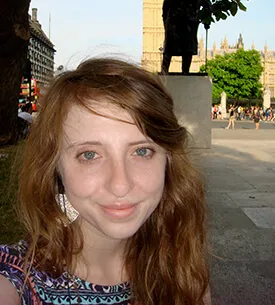University of Vermont (UVM) graduate student Ruby Daily is pursuing her Master's degree in the History program. She received a Graduate Student Summer Fellowship this past year and spent her time in London, visiting libraries, archives, and museums in support of her research.
IMPACT editor Dan Harvey spoke with Ruby recently to find out more about this outstanding UVM graduate student.
IMPACT: Ruby, congratulations on your Summer Fellowship. We’ll learn more about that later, but tell me a little bit about your background.
RD: I'm from Columbus, Ohio, and attended Wittenberg University -- a small private school -- as an undergraduate. But even before that, I grew up engaging in a lot of cultural activities and was a reading fanatic from a young age. By the time I was eight or nine, I was relatively certain that whatever I did with my life would involve history and as many books as possible.
I entered Wittenberg as a history major and almost all of my student jobs revolved around the history department -- either as a TA, faculty aid, researcher or archival assistant. I also experienced this breakthrough "Ah ha!" moment when I encountered cultural history for the first time during my junior year. It was so exciting to suddenly have all of these theoretical tools and accompanying philosophies that just made so much sense to me.
IMPACT: What a gift to have that breakthrough moment. As you were wrapping up your time at Wittenberg, what inspired you to go to graduate school at UVM?
RD: I had taken a few years off after I graduated with my BA to explore practicing history in non-academic venues. Knowing that grad school can take up to a decade and employment is intensely competitive, I wanted to be certain that becoming a professor was my dream. Over roughly a two-year period I experienced working for a Frank Lloyd Wright house museum, a historic preservation non-profit and an archive. While I worked with great people, doing things I believed in and cared about, none of these positions were fulfilling on the level that teaching and conducting intensive research had been. I chose UVM because it offered me a full fellowship, teaching and research opportunities, and access to distinguished faculty. It became obvious to me that UVM would be an excellent springboard for my ambitions to become a history professor.
IMPACT: As a staff member in the Graduate College, that is great to hear. Tell me about your experiences so far in graduate school: What it is like to work with faculty members and to do your own scholarship or research?
RD: I have been so spoiled thus far in my academic career when it comes to faculty. You hear horror stories, yet I keep ending up in happy, functional and cohesive departments. The history department at UVM is full of lovely, ultra-competent professors who are eager to offer their time and expertise, so it really has been wonderful.
I recently presented my work for the first time at a conference -- the Northeast Conference on British Studies or NECBS -- and it turned out to be more exhilarating and less terrifying than I had expected. My advisor is Dr. Paul Deslandes, and his encouragement and support were central in both prompting me to submit my work and the NECBS's decision to accept me. I am also currently a teaching assistant for a large, introductory history class and have been accruing know-how on grading, leading discussions, and professionally navigating the questions and needs of undergraduates. Being a TA has actually turned out to be a really fun aspect of my work here at UVM, partially because the undergraduates are this great -- and surprising -- mixture of silliness, insight and alternate perspective. They keep me on my toes and make me laugh a lot.
IMPACT: We mentioned in the introduction that you were on a summer research fellowship. Tell us about that.
RD: The Graduate Summer Fellowship allowed me to travel to London to work in the British Library, London Metropolitan Archives, and the Victoria and Albert Museum. It was an amazing experience. Every time I crossed an archival threshold I would think, "If all goes according to plan, I will be returning to this place periodically for the rest of my life." It made the trip feel very personally momentous. Ultimately, it was a great opportunity to get my feet wet in formal research -- a burgeoning skill that I think PhD programs will appreciate.
Moreover, I found the traditionally grumpy staff and rigid regulations to be quite charming, so I'm pretty sure I'm in the right field.
IMPACT: Tell us where you are in your graduate education and what you plan to do after graduating.
RD: I'm currently cramming for my first comprehensive exam and starting to work on chapter one of my thesis -- which I have been assured is the most difficult section. As UVM does not have a history doctoral program, soon I will begin applying to PhD programs. Hopefully by this time next year I will be settling into my new graduate program and gearing up for four more years of intensive reading, writing and teaching.
Undergraduates sometimes ask me about the graduate school experience and I always tell them that you have the joy of reading constantly and then you struggle to walk around without falling over as the books and papers take over your living space!
IMPACT: Best of luck in your comps and thesis. Your hard work and dedication, mixed with your excellent attitude should take you far!
